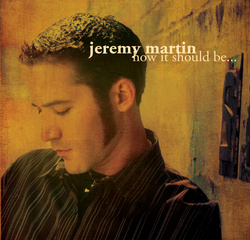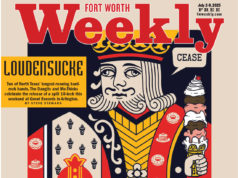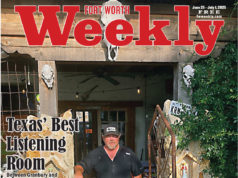Like most artists starting out, Texas Music singer-songwriter Jeremy Martin does whatever he must to pay the bills. And that sometimes means being a wedding singer, as it did last Saturday night, though in this case the couple getting hitched were good friends of his, and he was happy to do it.
Martin conducted this interview via cellphone inside his pickup truck, which was parked at a small reception hall about 30 miles west of Fort Worth. With a couple of hours to kill before the gig, he talked in a low mumble that was at once humble and authentically cool. Martin isn’t a showboater, but he knows what he’s good at: making painfully honest music.
 Anyone who listens to the 27-year-old’s recently released debut CD, How It Should Be, will likely agree. The album was hastily recorded with hired players and 10 hours of free studio time that he won at last year’s “Stock Show Showdown,” a musical competition sponsored by KFWR/95.9-FM The Ranch. As a result, the songs have a bland, cautious, demo-ish veneer. After a couple of spins, though, you start to appreciate Martin’s storytelling instincts. “The Angel and the Devil” and “Don’t Give Me a Reason to Fall” are two prime examples. His sincere, spacious vibrato puts a Southern-rock spin on the kind of grand-operatic heartache that Ray Price and George Jones built multi-decade careers on. But Martin’s start in the biz was not nearly as confident as his voice suggests.
Anyone who listens to the 27-year-old’s recently released debut CD, How It Should Be, will likely agree. The album was hastily recorded with hired players and 10 hours of free studio time that he won at last year’s “Stock Show Showdown,” a musical competition sponsored by KFWR/95.9-FM The Ranch. As a result, the songs have a bland, cautious, demo-ish veneer. After a couple of spins, though, you start to appreciate Martin’s storytelling instincts. “The Angel and the Devil” and “Don’t Give Me a Reason to Fall” are two prime examples. His sincere, spacious vibrato puts a Southern-rock spin on the kind of grand-operatic heartache that Ray Price and George Jones built multi-decade careers on. But Martin’s start in the biz was not nearly as confident as his voice suggests.
“It took a lot of playing and singing at open mics for me to feel comfortable” onstage, he said. “Someone told me, ‘If you don’t believe you’re a singer when you hit that stage, you won’t fool the audience.’ When I started writing songs about my own experiences, I could finally see myself [as a performer].”
Martin was born and raised in Springtown, about 24 miles outside of Fort Worth, amid a still-tight circle of family and friends. Although he’d sung along with radio tunes since he was a kid, his background was not especially musical. His grandfather had played bass with Willie Nelson back in the day and knew legendary Fort musicians like Ross Peacock, but the elder Martin ultimately resisted the full-time musician’s life because he wanted to be a stable, consistent presence for his family. He discussed his musical memories only
when prodded.
Meanwhile, Jeremy went off to Sul Ross State University in Alpine, with the goal of becoming an ambulance paramedic. He was as cash-poor as your average college student, so to fill the spare time, he bought a guitar, his first, and a CD by Red Dirt pioneers Cross Canadian Ragweed on the same day. “Practicing was a cheap way to entertain myself,” he said. “I’m still doing it the same way I started. I pick songs that have something to teach me, and then I learn them.”
Martin eventually dropped out of Sul Ross and returned with guitar in tow to Springtown, where his grandparents had relocated. A mixture of odd jobs, long practice hours, and timid open-mic appearances kept him busy. His grandfather, the ex-Willie associate, initially cautioned him against making a career in the wild world of Texas music, but once he realized that Jeremy would go forward with or without him on board, he gave his approval.
Martin moved to Fort Worth, where he cut his teeth at the White Elephant Saloon’s beer garden (now the Love Shack restaurant). Advice and support abounded there. Ray Wylie Hubbard once cautioned him to pick the songs for his albums carefully, because if one of them happened to become a big hit, “you’re gonna be singing it for the next 30 years.” Local legend Brad Hines became Martin’s mentor, “and I wouldn’t still be doing this if it weren’t for him,” Martin said. “He encouraged me when times were tough, and he was always honest. He made sure I had gigs when no one else would book me.”
With his vocal and instrumental muscles getting stronger, Martin began to concentrate on semi-confessional songwriting full of iconic images. His idols include the brooding, mystical Texas music guru Walt Wilkins and Townes Van Zandt’s tireless peer Guy Clark. Their influence can be heard on Martin’s apocalyptic “Battle of New Orleans,” the title also of a 1950s tune about the original Battle of NOLA. His song recounts his experiences hauling trailers between Texas and Louisiana for the Federal Emergency Management Agency right after Hurricane Katrina hit. He’d spend nights staring at the impossibly bright stars over the ravaged city’s neighborhoods — there was no electricity available. While the sky blazed beautifully overhead, the sounds of gunshots, dogs howling, and people screaming could be heard all around — New Orleans’ criminal element was taking advantage of the disaster. From his perspective, the lawlessness of some residents was a lot more dramatic, and more of a hindrance to rescue teams, than what was portrayed in news accounts: “The situation [encountered by the feds] was harder than it had to be.”
Just after the release of How It Should Be, Martin and his sometime backup duo, The Broken Story Band — Jason Morrow on drums and Todd Taliaferro on bass — earned another nod of encouragement: Last month they won The Ranch’s “Battle of the Bands” contest. The grand prize included new instruments, a professional photo shoot, a digital distribution deal, and, best of all, 20 free hours of studio time that the band will use to record Martin’s second CD, with a release tentatively planned for next year. By the end of 2010, Martin hopes to be promoting the hell out of his first two albums, expanding across the state and then out of it to perform an average of 200 shows per year. While he says Fort Worth and Springtown will always be his home bases, he’s not interested in being an exclusively Texas Music player. It’s a wanderer’s life the young musician feels he was fated to live.
“I always get my best sleep in hotel rooms,” he said. Where he used to be frightened of performing in person, Martin now “can’t imagine being away from the stage,” he said. “I love to put on a show. I want to help other young musicians the way I’ve been helped.”











